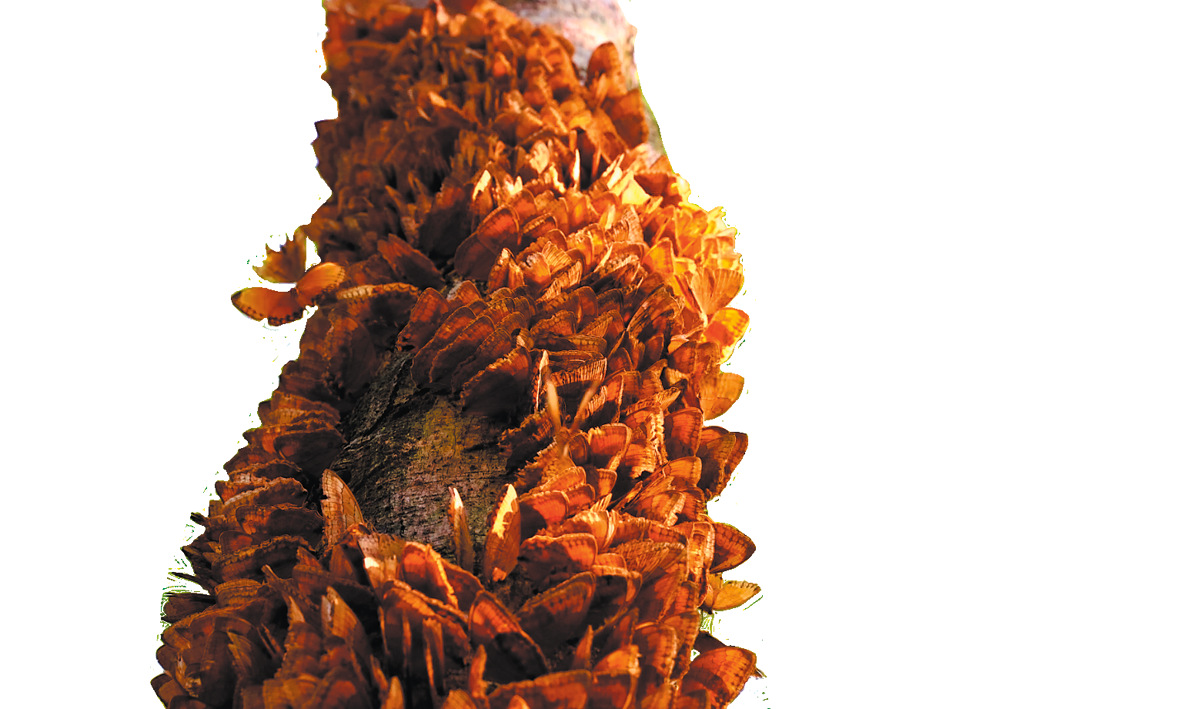

Research shows that the so-called butterfly valley in Maandi township has more than 320 species from 11 of the 12 butterfly families found in China, and the most common species is Stichophthalma, or jungle queen.
"The wings of jungle queen butterflies are golden yellow and interspersed with fish scale patterns. In the bright sunlight, their wings seem to reflect the sunrays and carpet the ground or tree branches with a layer of glittering gold," he said.
The spectacle of the butterfly explosion was largely unknown to the outside world until 1998, when a team of experts from Southwest Forestry University in Kunming, Yunnan, who intended to introduce local bamboo to the 1999 Kunming International Horticultural Exposition, visited there and stumbled across the phenomenon.
"Research into the butterfly explosion began in Jinping, and I was able to dedicate more time and effort to observing them," said Yang.
"Their wings are extremely thin and vulnerable. A single raindrop can weigh 20 or 100 times that of a butterfly's wings, and they can easily break if unfurled when wet," he said.
"So on rainy days, I look under tree leaves to find them resting there. If I want to get a closer look at their size and condition, I can only gently pick their bodies up by the tips of my fingers."
The life cycle of a butterfly includes four stages: egg, larva, pupa and adult, with the duration of each stage varying across different species. "Taking the jungle queen species as an example, they spend the majority of their lifetime as caterpillars or larvae, and die within 15 to 20 days after emerging from chrysalises," said Yang.
While the caterpillars mainly feed on bamboo leaves native in Jinping, adult butterflies absorb nutrients from a variety of liquids such as nectar, juice from rotting fruit and tree sap.
To meet the huge demand created by the sudden burst of butterflies in May and June each year, Yang takes the bottle of his sweet concoction with him when he patrols, spraying along the way. "The juice can extend their life span by five to seven days," he said.
There are four recommended areas for observing butterflies in the valley, but Yang goes further into the wild to carry out his research.
"There was a time in 2018 when I was walking in an expanse of primary forest, and I suddenly saw a bear scratching a tree about 10 meters away from me," he said. "My mind went blank at that moment, and I froze for a few seconds before sprinting back where I came from."
While running from the bear, Yang said he tripped on a fallen tree trunk and passed out.
"When I opened my eyes again, several hours had already passed, and I could only feel that my whole body was icy cold," he said. "After realizing that I was not dead, I made my way back home."
Yang said that he's had his fair share of accidents over the years, but the risk has never dampened his enthusiasm for potentially discovering new species and learning more about butterflies.
This year's butterfly explosion was described as being "only small" by Yang.
"There is a natural cycle of having a year with a large number of butterflies followed by a year with relatively fewer," he said. "This year's butterflies also appeared to be larger in size and very healthy, which I believe lays a solid foundation for next year's production of eggs and larvae."
Yang follows the same routine during the peak butterfly season each year.
"I usually set off from home around 6 am to examine how butterflies wake up from their resting places under leaves, and I don't return until dusk falls after they've laid their eggs," he said.
Countless hours spent in the forest have endowed Yang with a vivid understanding of the role butterflies play in nature.
"Because it is an extremely delicate insect, butterflies can also be as seen as a symbol of the health of the local ecology, and only in a favorable, healthy environment can the spectacle of a butterfly explosion occur," he said.
Yang said that about 90 percent of butterflies are eaten by other insects before they reach the adult stage. "As a result, behind a butterfly explosion is an enormous population of diverse animals. Butterflies not only provide a breathtaking sight for us to enjoy, but also contribute to biodiversity," he added.
To step up the protection of butterflies, Jinping county released a regulation in October 2012, which prohibits actions such as altering the natural state of the water environment, spraying pesticides, indiscriminately cutting down trees or digging up bamboo shoots.
Sun Sen, deputy head of the county, said that habitat destruction, environmental pollution, use of fertilizers and pesticides, global climate change, invasive species and overexploitation of resources are regarded as the major challenges in butterfly conservation.
In addition to the release of the regulation, Sun said the county has stepped up awareness campaigns among the public, cracked down on the illegal collection and trade of butterflies and helped advance scientific research to improve conservation technologies.